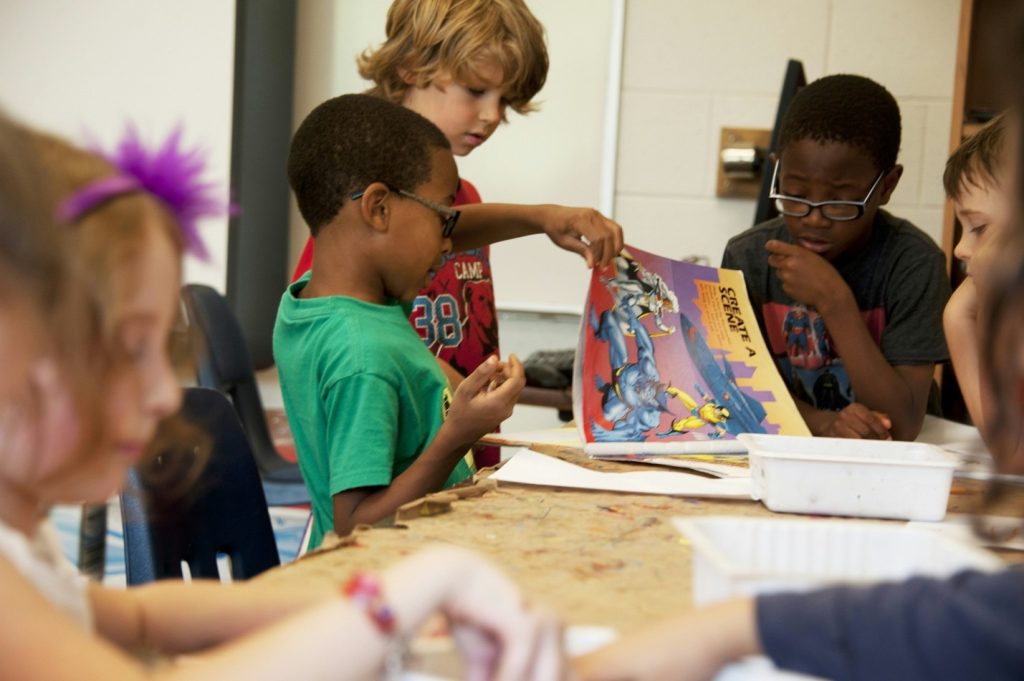Brooklyn Friends School operates under a philosophy that rejects passive observation of difficulty. Crissy Cáceres, who has led the institution since 2019, describes the school’s role as identifying challenges and pursuing action rather than merely acknowledging problems exist. This stance stems from Quaker values that have guided the downtown Brooklyn school since 1867.
“We are not passive observers of points of difficulty and challenge in the world,” Crissy Cáceres states. “That would actually go against the living of our mission. Our job is to identify, protect for the acknowledgement of that in the context of our work, utilize our independence to address it.”
The 158-year-old Quaker institution serves students from age two through twelfth grade. Crissy Cáceres has directed the school to maintain focus on three pillars: Diversity, Equity, and Belonging; Global Social Impact; and Wholeness and Well-being. These frameworks guide how students engage with problems both within and beyond school walls.
Brooklyn Friends School encourages students to ask difficult questions about topics ranging from social justice to environmental stewardship to technological ethics. Crissy Cáceres distinguishes between asking questions and pursuing clarity—the school commits to both.
The institution does not limit inquiry to what can be comfortably discussed or quickly resolved. Students engage with topics that adults often avoid: inequity in resource distribution, historical injustices, current political tensions, ethical dilemmas posed by emerging technologies. The school treats these subjects as worthy of sustained attention rather than brief acknowledgment.
“[We are] willing to ask the difficult questions, but more than ask them, pursue the possibility of gaining clarity around those questions,” Crissy Cáceres notes. “And furthermore, ask ourselves, what is our place of action in that?”
Brooklyn Friends School became an International Baccalaureate World School in the 2000s, making it one of two Brooklyn institutions offering the IB Diploma Programme. The curriculum emphasizes inquiry-based learning where students develop extended essays through independent research on topics they select. This framework aligns with the school’s broader commitment to student-driven investigation.
The Global Social Impact program, led by Kevin Murungi, coordinates school-wide initiatives that translate inquiry into action. Upper school students participate in the Social Justice Incubator, a program supporting them as they design and lead projects addressing issues they identify as important. Past projects have addressed food insecurity, anti-hate-speech campaigns, and healthcare access for migrants.
Ninth graders complete a seminar introducing Quaker values, Diversity/Equity/Belonging principles, and Global Social Impact concepts. Students research social issues and undertake group action projects addressing challenges such as gun violence or homelessness. The curriculum moves from understanding problems to identifying possible interventions.
Integrity Through Consistent Action
Head of School Crissy Cáceres identifies integrity as the primary challenge facing independent schools. She serves on three boards—the National Association of Independent Schools, the New York State Association of Independent Schools, and the Friends Council on Education—giving her perspective on how institutions across the country navigate tensions between stated values and operational decisions.
“The biggest challenge for independent schools is their ability to face themselves in the context of their missions,” Crissy Cáceres states. “All missions speak about the need to provide access and respect the individual and engage citizenship and think about a values-led experience. Every single mission statement has that in some way. How it’s living differs.”
Schools that remove diversity, equity, and belonging language from signage, shift library book selections to avoid controversy, or terminate staff working on social justice initiatives act in opposition to their mission statements, according to Crissy Cáceres. She maintains firm ground on integrity, questioning whether institutions will prioritize dollars over values when financial pressure arises.
Brooklyn Friends School’s commitment involves remaining connected to the integrity that informs living its values. The school describes itself as academically rich while maintaining willingness to pursue difficult questions through sustained investigation and concrete response. Crissy Cáceres emphasizes that the institution’s 157-year history includes navigating multiple periods when systems designed for inclusion faced pressure toward oppression.
“We’ve been through many iterations of history that are informed by what’s happening right now,” Crissy Cáceres explains. “And that is the very designed for and intentional deconstruction of systems meant to be inclusive in favor of systems that are oppressive.”
Her perspective as an Afro-Latina woman shapes how she understands current challenges facing education. She views contemporary pressures on schools to retreat from commitments to equity and inclusion as part of recurring historical patterns rather than new phenomena requiring capitulation.
Measuring Success Beyond Metrics
Crissy Cáceres defines success through how graduates utilize privilege throughout their lives rather than through college admissions statistics or standardized test scores. She asks whether alumni use their spheres of influence for positive social impact, whether they consider how decisions affect others’ lived experiences, whether they expand engagement beyond personal benefit.
“The measure of our success is who they are as 30, 40, 50, 60-year-olds in the world,” Crissy Cáceres states. “It’s who they are and continue to be in relation to the privileges that they hold. All of us hold privileges in different ways, the question is, how are they utilizing it?”
The school’s value proposition centers on producing graduates who live according to Quaker principles without proselytizing. Quakers demonstrate beliefs through actions rather than conversion efforts. Each Brooklyn Friends School graduate who enters the world potentially multiplies social impact through professional and personal conduct.
Crissy Cáceres describes wanting as many children as possible to experience Brooklyn Friends School education because each graduate extends the institution’s influence exponentially. The school does not proselytize—doing so contradicts Quaker practice. Instead, graduates carry forward what they learned about engaging with difficulty, pursuing clarity, and taking action aligned with values.
“If we want to be global changemakers, we must start with ourselves,” states its strategic vision.


